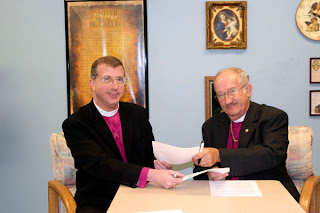
Beginning June 1st we will be on the road from cold damp Arizona to Maryland's sunny Eastern Shore (or so I keep trying to convince myself. So far it's not working). Therefore, it may be more than a week before I can post again or say much. Pray for our safety.
For Sunday, I give you the words of Hymn 268 (from the 1940 hymnal), The Breastplate of St. Patrick, with extra words from the original hymn by the great British missionary to the Irish, and saint (translated by Cecil F. Alexander). It's not the sermon I usually offer, and I am pressed for time. But raise your voice and your hearts. Remember that the revelation of the Trinity has everything to do with our salvation in Jesus Christ.
I bind unto myself today
The strong Name of the Trinity,
By invocation of the same
The Three in One and One in Three.
I bind this day to me forever
By power of faith, Christ’s incarnation;
His baptism in the Jordan river,
His death on Cross for my salvation;
His bursting from the spicèd tomb,
His riding up the heavenly way,
His coming at the day of doom
I bind unto myself today.
I bind unto myself the power
Of the great love of cherubim;
The sweet ‘Well done’ in judgment hour,
The service of the seraphim,
Confessors’ faith,
Apostles’ word,
The Patriarchs’ prayers, the prophets’ scrolls,
All good deeds done unto the Lord
And purity of virgin souls.
I bind unto myself today
The virtues of the star lit heaven,
The glorious sun’s life giving ray,
The whiteness of the moon at even,
The flashing of the lightning free,
The whirling wind’s tempestuous shocks,
The stable earth, the deep salt sea
Around the old eternal rocks.
I bind unto myself today
The power of God to hold and lead,
His eye to watch,
His might to stay,
His ear to hearken to my need.
The wisdom of my God to teach,
His hand to guide,
His shield to ward;
The word of God to give me speech,
His heavenly host to be my guard.
Against the demon snares of sin,
The vice that gives temptation force,
The natural lusts that war within,
The hostile men that mar my course;
Or few or many, far or nigh,
In every place and in all hours,
Against their fierce hostility
I bind to me these holy powers.
Against all Satan’s spells and wiles,
Against false words of heresy,
Against the knowledge that defiles,
Against the heart’s idolatry,
Against the wizard’s evil craft,
Against the death wound and the burning,
The choking wave,
the poisoned shaft,
Protect me, Christ, till Thy returning.
Christ be with me,
Christ within me,
Christ behind me,
Christ before me,
Christ beside me,
Christ to win me,
Christ to comfort and restore me.
Christ beneath me,
Christ above me,
Christ in quiet,
Christ in danger,
Christ in hearts of all that love me,
Christ in mouth of friend and stranger.
I bind unto myself the Name,
The strong Name of the Trinity,
By invocation of the same,
The Three in One and One in Three.
By Whom all nature hath creation,
Eternal Father, Spirit, Word:
Praise to the Lord of my salvation,
Salvation is of Christ the Lord.






